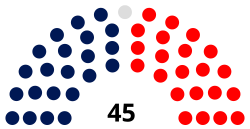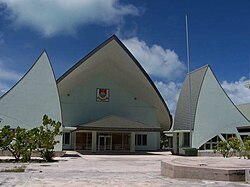House of Assembly (Kiribati): Difference between revisions
Tawita2020 (talk | contribs) Clean up of page and correction of references Tag: Reverted |
Tawita2020 (talk | contribs) m Tawita2020 moved page House of Assembly (Kiribati) to Kiribati Parliament: 'House of Assembly' is colonial era terminology and not appropriate |
(No difference)
| |
Revision as of 10:33, 21 November 2021
Kiribati Parliament Maneaba ni Maungatabu | |
|---|---|
 | |
| Type | |
| Type | |
| History | |
| Founded | 12 July 1979 1 May 1974 (as House of Assembly of the Gilbert and Ellice Islands) 1 January 1976 (as House of Assembly of the Gilbert Islands) |
| Leadership | |
Tangariki Reete (since 2020) | |
| Structure | |
| Seats | 45 members (44 elected + 1 nominated Member) |
 | |
Political groups | Boutokaan Kiribati Moa Party (22) Independent (1) |
| Elections | |
| Plurality voting modified by two-round system | |
Last election | 14 and 21 April 2020 |
Next election | 2024 |
| Meeting place | |
 | |
| Ambo, South Tarawa | |
| Website | |
| www | |
 |
|---|
| Subdivisions |
The Kiribati Parliament (Gilbertese: Maneaba ni Maungatabu, lit. 'meeting house of the sacred mountain') is the Legislature of Kiribati. Since 2016 it has comprised 45 members, 44 elected to a four-year term from 7 single-member and 16 multi-member constituencies, and 1 delegate representing the Banaban community on Rabi Island in Fiji, nominated by the Rabi Council of Leaders. From Independence in 1979, the Attorney-General had been an ex officio member of Parliament, until the Constitution was amended (with effect from 28 September 2016) to remove this privilege.

From Independence until 2000, Parliament sat in Bairiki village on South Tarawa, in the building that had accommodated the colonial era House of Assembly. In October 2000 Parliament moved to new premises in Ambo village, South Tarawa.
History
Colonial era
The decolonisation process for the Gilbert and Ellice Islands Colony began with a Colony conference in 1956. An Advisory Council was established in 1963, comprising 5 elected members and 12 ex officio members. The Advisory Council was replaced by a House of Representatives, comprising 23 members, in 1967, which was itself replaced by a 28-member Legislative Council in 1970. A new constitution entered into effect on 1 May 1974, establishing a 28-member House of Assembly. Later that year the Tuvaluan people of the Ellice Islands voted in a referendum to separate from the Gilbert Islands, with the separation taking effect on 1 January 1976.
Post-independence
The Gilbert Islands gained independence as the Republic of Kiribati on 12 July 1979. The 35 elected members of the former House of Assembly (who had been elected at the 1978 general elections) automatically became members of the new Parliament, with the addition of the delegate from Rabi and the Attorney-General (ex officio). Following reviews by the Electoral Commission, the number of elected members was increased to 36 for the 1982 general elections, to 39 in 1987, 40 in 1990, 41 in 2003 and to the present 44 in 2007.[1] The Attorney-General ceased to be an ex officio member of Parliament from 28 September 2016.
Speaker
The Parliament is presided over by a Speaker, elected by its members from outside Parliament under section 71 of the Constitution.[2]
At the first parliamentary sitting following general elections (and whenever the office of Speaker is vacant), the Chief Justice presides over the Parliament for the purpose of electing a new Speaker. Conduct of the election proceeds in accordance with Rule 6 of the Parliament's Rules of Procedure.[3]
Under section 72(3)(a) of the Constitution, the Speaker does not have a vote on any matter, either original or casting. Should a vote result in a tie, the Speaker has to declare it as lost.[2]
Logo
On 26 October 2020, the Parliament adopted a new logo.
See also
References
- ^ "The Legislative Assembly | Parliament of Kiribati". www.parliament.gov.ki. Archived from the original on 2021-10-23. Retrieved 2021-11-21.
- ^ a b "Constitution of Kiribati | Parliament of Kiribati". www.parliament.gov.ki. Archived from the original on 2021-10-22. Retrieved 2021-11-21.
- ^ "Rules of Procedure | Parliament of Kiribati". www.parliament.gov.ki. Archived from the original on 2021-10-22. Retrieved 2021-11-21.
External links
1°21′01″N 173°02′20″E / 1.35028°N 173.03889°E
